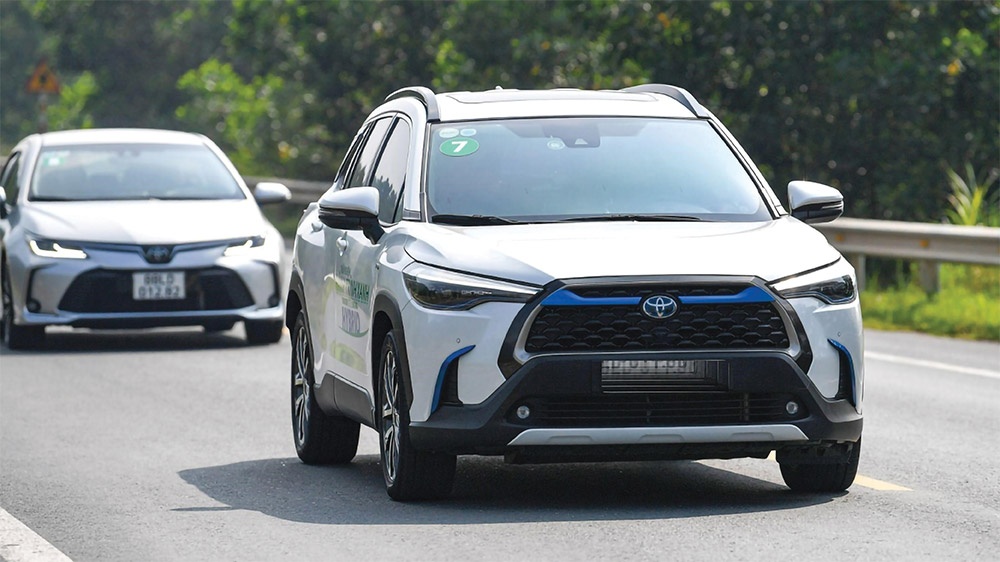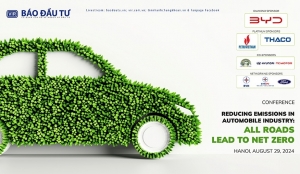Hybrid vehicles enter SCT overhaul debate
 |
| Varying types of hybrid vehicles make it more challenging to determine tax levels for them, photo Le Toan |
International auditors KPMG in collaboration with the Vietnam Automobile Manufacturers’ Association (VAMA) last month released a research report on the impact of proposed changes to the Law on Special Consumption Tax (SCT) on the vehicle industry, with reference to the experience of a number of countries.
Of this, the VAMA proposed incentive SCTs for self-charging hybrid electric vehicles (HEVs) at 70 per cent of the tax rate applied to gasoline-powered vehicles of the same type (currently 100 per cent); and plug-in hybrid electric vehicles (PHEVs) at 50 per cent of the tax rate applied to petrol-powered vehicles of the same type (currently 70 per cent).
The association said this aims to encourage the conversion from internal combustion engine vehicles to pure EVs. In the short term, incentives for HEVs and PHEVs will reduce state budget revenue, but generate other economic, environmental, and social benefits. If the incentives are approved, the selling price of HEV or PHEV will reduce to almost the same as internal combustion engine vehicles.
“Specifically, the Toyota Corolla Cross HEV version, which is currently priced at $38,200, will become $35,000, only $640 higher than the petrol model, if the SCT incentive was given, thereby encouraging consumers to use this environmentally friendly vehicle,” a VAMA representative said at a conference held by the Central Institute for Economic Management in early August.
The latest draft law released in July has already stipulated an incentive SCT rate at 70 per cent of the corresponding petrol car for PHEVs, while HEVs will still have to subject to the same tax rate as the corresponding gasoline-powered cars.
“This is not really reasonable because HEVs still reduce the use of fossil fuels and is a transition to pure EVs, while charging stations and technology are not convenient enough for consumers,” the Vietnam Chamber of Commerce and Industry (VCCI) said.
The VCCI recommends the Ministry of Finance to consider policies to encourage HEVs without separate charging systems, with tax rates lower than those for corresponding petrol-powered vehicles.
“Countries with similar characteristics and development levels as Vietnam, including Thailand, Indonesia, Malaysia, and the Philippines, all have preferential policies for environmentally friendly vehicles,” a VCCI report said.
The report from KPMG and the VAMA assessed that HEVs could reduce fuel usage and emissions by 30-40 per cent compared to petrol vehicles, and PHEVs by 50 per cent. The price of hybrid vehicles is 10-20 per cent higher than that of petrol vehicles of the same type, which may not encourage people to switch.
They estimate that if the SCT is applied, the total state budget revenue in 2026-2030 will decrease by about $940 million, but the benefits from reducing CO2 emissions and saving fuel will be more valuable, they noted. They calculated the total economic benefits to be more than $144 million over the period.
Dam Hoang Phuc, director of the Automotive Engineering Training Programme at the Hanoi University of Science and Technology, said there were currently many car models on the market with different configurations or technical characteristics, providing different fuel economy and emission reduction capabilities. Therefore, the SCT on hybrid cars needs to have tax schedules commensurate with emission reduction.
“If we use displacement for cars using internal combustion engines to tax, then for hybrid cars, we should base it on the electric capacity to ensure the balance of technology, the contribution to fuel saving, and emission reduction. A general rate at 70 per cent is not enough,” Phuc said.
However, in the view of Vu Tan Cong, deputy general director of Vietnam Automobile Industry and Trade Consulting, EVs still cause environmental pollution.
According to Vietnam Electricity, the total electricity output of the system in the first quarter of 2024 reached 69.4 billion KWh. The proportion of power sources is 57.6 per cent from coal-fired thermal power, 16.5 per cent from renewable energy, 15.3 per cent from hydropower, 8.7 per cent from gas turbines, and 1.7 per cent imported.
“Of these, coal-fired thermal power and gas turbine power cause a lot of environmental pollution. EVs still pollute because of charging from the national grid. They only transfer environmental pollution from operation to coal-fired thermal power plants and gas turbine power plants,” Cong said.
Moreover, due to the larger weight of EV tyres compared to ones used by internal combustion engines, EV tyres wear out faster.
“This means that EVs emit more fine dust from tyres than cars using internal combustion engines,” Cong added. “In addition, when EVs reach the end of their useful life, the batteries must be properly disposed of to avoid polluting the environment. Thoroughly disposing of these expired EVs batteries is costly and challenging.”
He suggested reducing the SCT for PHEVs only, and not for mild hybrids and full hybrids.
The draft Law on SCT is due to be submitted to the National Assembly in early September.
 | Supporting a green strategy for the automotive industry With 6.5 million cars and 74 million motorcycles, Vietnam is the second-largest emitter of greenhouse gases (GHGs) from road transport in Southeast Asia, following Indonesia. Emissions from road vehicles in the country are rising rapidly, with an average annual increase of about 15 per cent over the past decade. |
What the stars mean:
★ Poor ★ ★ Promising ★★★ Good ★★★★ Very good ★★★★★ Exceptional
Related Contents
Latest News
More News
- Masan Consumer names new deputy CEO to drive foods and beverages growth (February 23, 2026 | 20:52)
- Myriad risks ahead, but ones Vietnam can confront (February 20, 2026 | 15:02)
- Vietnam making the leap into AI and semiconductors (February 20, 2026 | 09:37)
- Funding must be activated for semiconductor success (February 20, 2026 | 09:20)
- Resilience as new benchmark for smarter infrastructure (February 19, 2026 | 20:35)
- A golden time to shine within ASEAN (February 19, 2026 | 20:22)
- Vietnam’s pivotal year for advancing sustainability (February 19, 2026 | 08:44)
- Strengthening the core role of industry and trade (February 19, 2026 | 08:35)
- Future orientations for healthcare improvements (February 19, 2026 | 08:29)
- Infrastructure orientations suitable for a new chapter (February 19, 2026 | 08:15)

 Tag:
Tag:



















 Mobile Version
Mobile Version